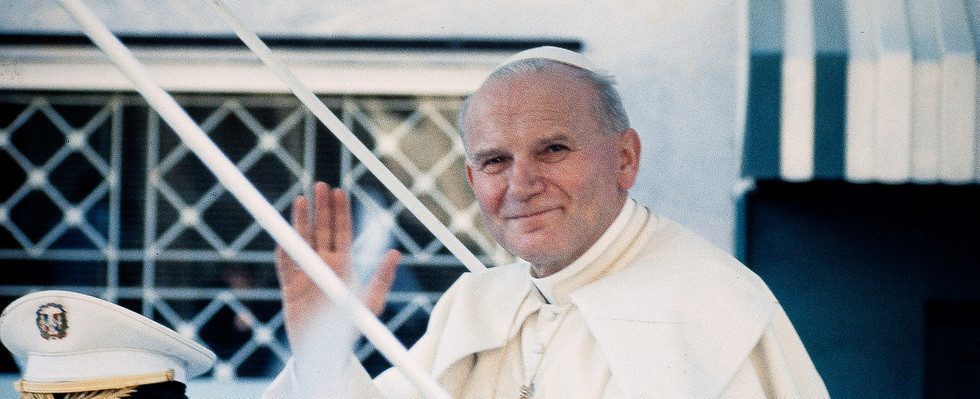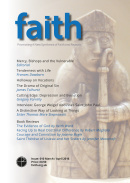St John Paul's Biographer
Joanna Bogle FAITH MAGAZINE March - April 2016
Saint John Paul's Biographer
Catholic writer, lecturer and papal biographer George Weigel is a diffcult man to pin down. He’s in America, he’s in Rome, he’s in Poland . . . We caught him just as he was leaving a meeting of The Keys, the Catholic Writers’ Guild, in London, where he had been guest speaker. Would he be willing to give an interview to FAITH magazine? Yes, of course . . . but he was hurrying off . . . would we email?
Once contact is made, he unwinds. He knows London well, and often stays at St Patrick’s, Soho, where he spoke at the Day of Faith organised by the Faith Movement in the summer of the Year of Faith in 2013.
He will always be identified as the biographer of St John Paul II. – Witness to Hope was published in 1999 and there was a follow-up volume in 2010. Inevitably the rst question must link to that subject. Did he imagine, when he was working on the project that he might one day be at John Paul’s canonisation?
‘Anyone who spent any serious amount of time with Karol Wojtyla knew that he was a man of “heroic virtue” which is what the Church asks of those whom it proposes as saints. I think John Paul’s sanctity became even more luminous as he grew older and more seriously ill and seemed completely “unheroic” as the world typically understands heroism. By emptying himself completely of himself in fulfilment of the mission he had been given, he reminded the world that there are no “disposable” human beings, and he reminded the Church that St Paul taught about weakness being a vessel for the revelation of God’s strength.’
Relevance
When asked about the relevance of St John Paul for today’s world – after the collapse of Communism, and with fresh threats from militant Islam etc. – Weigel is convinced.
‘John Paul II never lived in a mature democracy, yet he had a keen insight into the moral and cultural prerequisites for a successful democracy. He laid them out in some detail in his 1991 encyclical, Centesimus Annus, and he revisited the subject in his 2003 apostolic letter, Ecclesia in Europa. Anyone interested in the roots of the current western crisis of civilisational confidence would be well-advised to study those texts carefully.’ And he sees a continuing enthusiasm among young Catholics for the JPII approach to the Faith: ‘John Paul understood that the young want to be challenged to lead lives of heroism. That challenge remains quite attractive today, as all successful Catholic youth organizations understand.’
Spiritual plight
Weigel is also among a number of Catholic writers who have explored the spiritual plight of modern Europe. Asked for a wish-list of what might help to arrest the decline of the Church in its former heartlands, he is emphatic and seems to relish making a list...one which rather chimes with what many other thinking Catholics would offer: ‘1) strong, evangelically assertive bishops who know how to handle the media and can call the people of the Church to live out their vocation as missionary disciples. 2) Catholic intellectuals and writers, both lay and clergy, who can get beyond the usual progressive/traditionalist polarities and explain Vatican II in John Paul II’s terms, as a call to the “New Evangelization”. 3) Downsizing local diocesan bureaucracies and episcopal conference bureaucracies and putting increased resources into evangelization, especially among young people. 4) Compelling, beautiful liturgy: the Novus Ordo done as it can and should be done. 5) Intellectual centres and small magazine that build cadres of Catholics committed to the New Evangelization and that work hard to evangelize the culture.’
America
For a long while, Catholics in Britain have tended to think that trends in the American Church are all in a dreary direction, too, but there is increasing evidence that this is not the case, and Weigel – a strong critic of much the American Church over the years – now sees many signs of hope. ‘The American episcopate has been strong in its defence of the liberty of the Church against the attacks of the Obama administration, and a healthy majority of our bishops now think of themselves as evangelists as well as administrators. The vast majority of the priests under 45 years old take John Paul II as their vocational model. The seminaries have, with one or two exceptions, been thoroughly and appropriately reformed for the New Evangelization, and some are more full than they’ve been in forty years. The growing communities of men and women religious are those that take the life of the vows seriously and that live their consecrated life in a distinctive way. There are many strong and vibrant parishes.
‘There is an active, articulate Catholic intelligentsia that is both orthodox and forward-looking. There is enormous generosity in supporting the Church’s educational, health care and social service facilities. The pro-life movement is getting larger and younger. There are remnants of “the revolution that never was”, but their “demographics” are not such that they can anticipate a bright future ahead. We’ve got lots of problems, including a residual sense in some quarters that the Church will do just ne if we just keep the sacramental machinery ticking over, but compared to the Church in the rest of the developed world, we’re in rather good shape.’
Wiegel believes that the John Paul legacy will be a lasting one: ‘His teaching is so vast, so comprehensive, and so deep that the Church will be wrestling with it for centuries to come. Moreover, any fair-minded person will recognise that much of what Pope Francis has been (rightly) applauded for was made possible by John Paul II doing precisely the same things: so a model has been set for the future, and it’s a John Paul II model.’
Notes:


